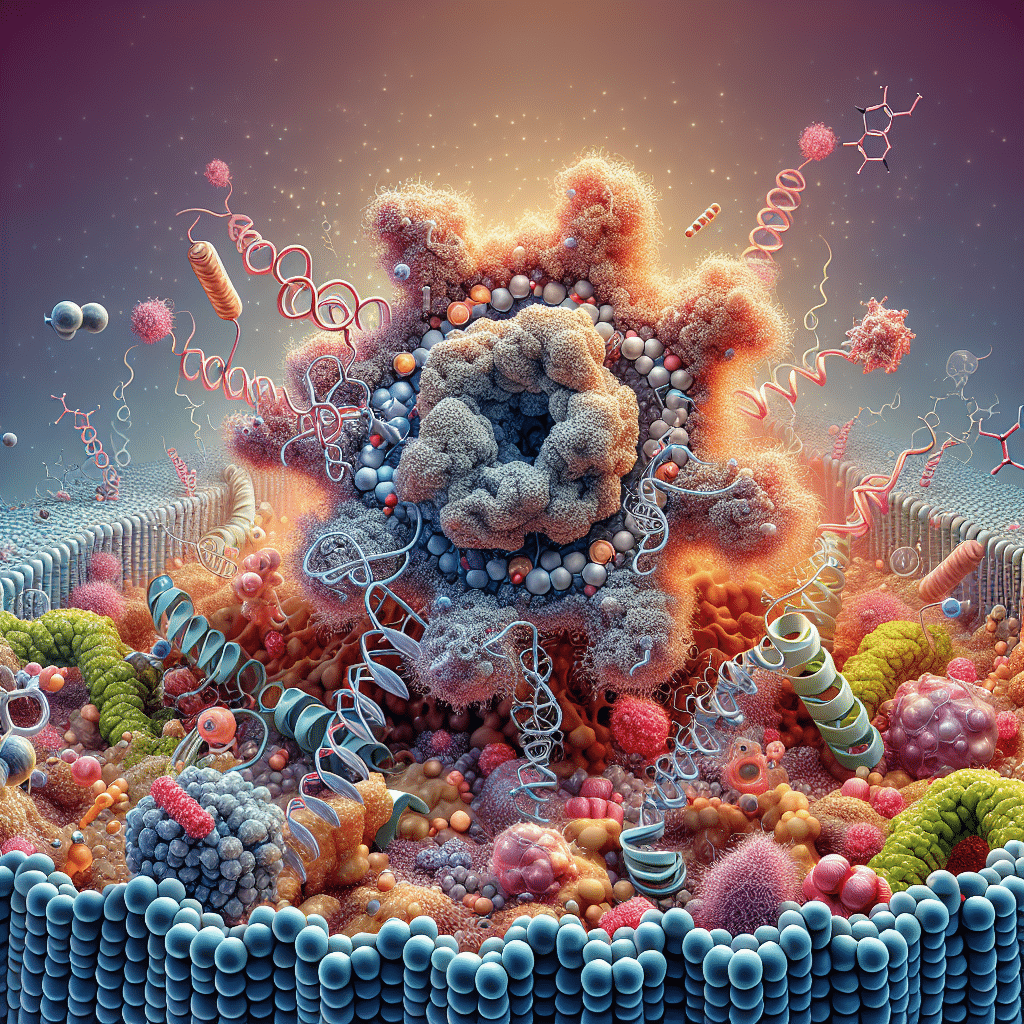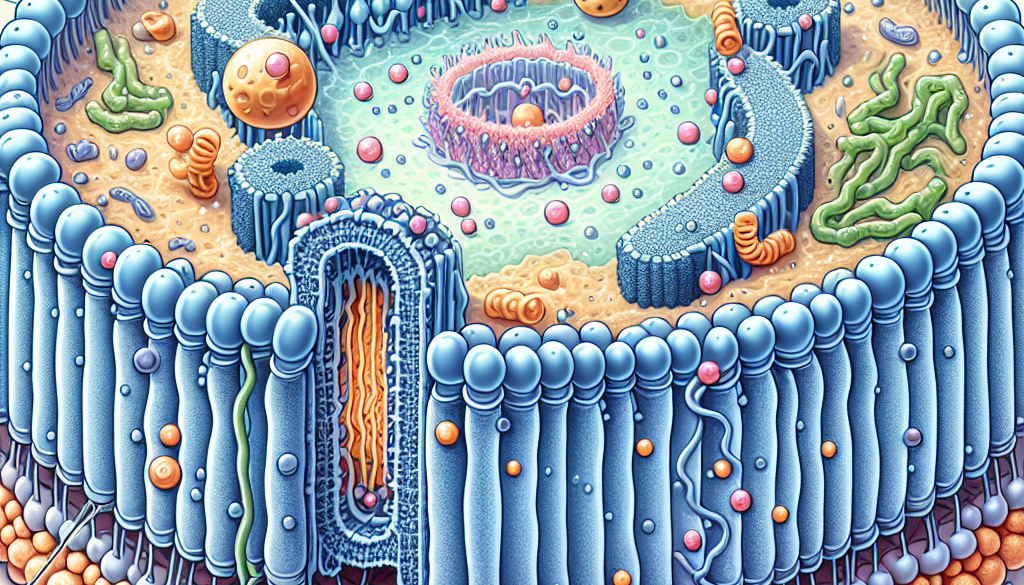Porin Protein: Unlocking Cell Secrets
-
Table of Contents
- Porin Proteins: Deciphering the Mysteries of Cellular Function
- Understanding Porin Proteins
- The Structure of Porin Proteins
- Function and Diversity of Porins
- Porin Proteins in Research and Medicine
- Case Studies and Applications
- Statistics Highlighting the Importance of Porin Research
- Challenges and Future Directions
- Technological Advances in Porin Research
- Conclusion: Key Takeaways on Porin Proteins
- Discover High-Quality Proteins with ETprotein
Porin Proteins: Deciphering the Mysteries of Cellular Function

Porin proteins are integral components of cellular membranes, serving as gatekeepers that regulate the flow of molecules in and out of cells. These proteins are not just structural elements; they are dynamic and vital to the survival and proper functioning of cells. Understanding porin proteins is crucial for unraveling the complex mechanisms that underpin cellular function and for developing targeted therapies for various diseases. This article delves into the world of porin proteins, exploring their structure, function, and significance in cell biology.
Understanding Porin Proteins
Porin proteins are a class of proteins that form channels through the outer membranes of cells, particularly in bacteria, mitochondria, and chloroplasts. They are characterized by their barrel-shaped structure, which allows the passive diffusion of specific molecules, such as ions, sugars, and amino acids. Porins are essential for maintaining the balance of nutrients and waste products between the cell and its environment.
The Structure of Porin Proteins
Porins are typically composed of beta-barrel structures that span the lipid bilayer of the membrane. These barrels are made up of beta-strands, which are connected by loops that can act as gates, opening or closing the pore based on environmental signals. The specificity of porins is determined by the size and charge of the pore, as well as the presence of selectivity filters within the channel.
Function and Diversity of Porins
Porins serve various functions depending on their location and the type of cell they are in. In bacteria, porins are crucial for nutrient uptake and antibiotic resistance. In eukaryotic cells, mitochondrial porins, also known as voltage-dependent anion channels (VDACs), play a role in energy metabolism and apoptosis. Chloroplast porins are involved in photosynthesis and metabolite exchange.
Porin Proteins in Research and Medicine
The study of porin proteins has significant implications for medical research and the development of therapeutic interventions. By understanding how porins control the passage of substances into and out of cells, researchers can devise strategies to combat bacterial infections, treat metabolic disorders, and even trigger programmed cell death in cancer cells.
Case Studies and Applications
- Antibiotic Resistance: Research into bacterial porins has revealed mechanisms by which bacteria become resistant to antibiotics. Modifying porins or blocking their function can enhance the effectiveness of existing antibiotics.
- Metabolic Disorders: Mitochondrial porins are involved in the transport of metabolites necessary for energy production. Understanding their role can lead to treatments for metabolic diseases such as diabetes.
- Cancer Therapy: VDACs are involved in the release of cytochrome c, a step in apoptosis. Targeting these porins can induce cell death in cancer cells, offering a potential therapeutic pathway.
Statistics Highlighting the Importance of Porin Research
Statistics from the World Health Organization (WHO) show that antibiotic resistance is a growing global health concern, with porin mutations being a contributing factor. Additionally, the global prevalence of diabetes, as reported by the International Diabetes Federation (IDF), underscores the need for research into metabolic pathways involving porins.
Challenges and Future Directions
While the study of porin proteins has advanced significantly, challenges remain. The dynamic nature of porins and their interaction with other cellular components make them complex targets for research. Future directions include the development of more sophisticated models to study porin function and the exploration of novel therapeutic agents that can modulate porin activity.
Technological Advances in Porin Research
Advancements in cryo-electron microscopy and computational modeling have provided deeper insights into the structure and function of porin proteins. These technologies enable researchers to visualize porins at atomic resolution and simulate their behavior in different environments.
Conclusion: Key Takeaways on Porin Proteins
Porin proteins are more than just structural components of cell membranes; they are critical to the regulation of cellular homeostasis and play a pivotal role in health and disease. The study of porins has led to a better understanding of bacterial resistance, metabolic disorders, and cancer, with the potential to inform new therapeutic strategies. As research continues to evolve, the secrets unlocked by porin proteins will undoubtedly contribute to the advancement of medical science.
Discover High-Quality Proteins with ETprotein
If you’re looking for premium protein products, ETprotein offers an extensive range of plant-based proteins that cater to various industries. Their commitment to quality, non-GMO, and allergen-free products makes them a top choice for businesses seeking reliable protein sources. Whether you’re involved in nutraceuticals, pharmaceuticals, or food and beverage production, ETprotein has the expertise to meet your protein needs with their organic and clear protein options.
About ETprotein:
ETprotein, a reputable plant protein vegan protein Chinese factory manufacturer and supplier, is renowned for producing, stocking, exporting, and delivering the highest quality organic bulk vegan protein and plant proteins. They include Organic rice protein, clear rice protein, pea protein, clear pea protein, watermelon seed protein, pumpkin seed protein, sunflower seed protein, mung bean protein, peanut protein etc. Their offerings, characterized by a neutral taste, non-GMO, allergen-free attributes, cater to a diverse range of industries. They serve nutraceutical, pharmaceutical, cosmeceutical, veterinary, as well as food and beverage finished product distributors, traders, and manufacturers across Europe, USA, Canada, Australia, Thailand, Japan, Korea, Brazil, and Chile, among others.
ETprotein specialization includes exporting and delivering tailor-made protein powder and finished nutritional supplements. Their extensive product range covers sectors like Food and Beverage, Sports Nutrition, Weight Management, Dietary Supplements, Health and Wellness Products, and Infant Formula, ensuring comprehensive solutions to meet all your protein needs.
As a trusted company by leading global food and beverage brands and Fortune 500 companies, ETprotein reinforces China’s reputation in the global arena. For more information or to sample their products, please contact them and email sales(at)ETprotein.com today.












